Minds of the Movement
An ICNC blog on the people and power of civil resistance
by Amber French, Capucine Quévillon and Alain RefaloSeptember 02, 2024
The working group of the Institute for Peace (IPP), “Civil resistance, nonviolence and the culture of peace”, focuses on three concepts or approaches that intersect both in their theoretical dimensions and in their practical expressions. The aim of the group is to develop its research axes and to pursue targeted activities for the academic, activist, media, associative and political communities, with an emphasis on educational materials. We aspire to bring together diverse Francophone communities of thought and practice, to broaden the horizons of a still very young field of study, and to promote the work that has been produced on our subjects in French over the past several decades.
Civil resistance is an approach rooted in the social sciences that until now has mostly evolved within Anglo-Saxon universities. French historian and genocide scholar, Jacques Semelin is noted for being the first to use the term in French (résistance civile) in Unarmed against Hitler (original French version published in 1989) and has since published numerous studies focusing on this approach, which can be described as when ordinary people engage in collective action to nonviolently resist systems of oppression and entrenched dictatorships.
ICNC's Amber French, who is based in Paris, is at the origin of the IPP working group, but the conception of the group evolved significantly and became more transversal in contact with numerous researchers and thought leaders in the French nonviolence community (among them Cécile Dubernet of the Catholic Institute of Paris, Raphaël Porteilla of the Université de Bourgogne and Alain Refalo, an expert in nonviolence). Each brought his or her own knowledge to the group, with the aim of strengthening and broadening the group's work. ICNC has co-sponsored a number of the group's activities since 2022 and envisages to build a partnership with IPP in the framework of this group. IPP recently released the group's concept note, which articulates the three working themes of the group and how they diverge and intersect.
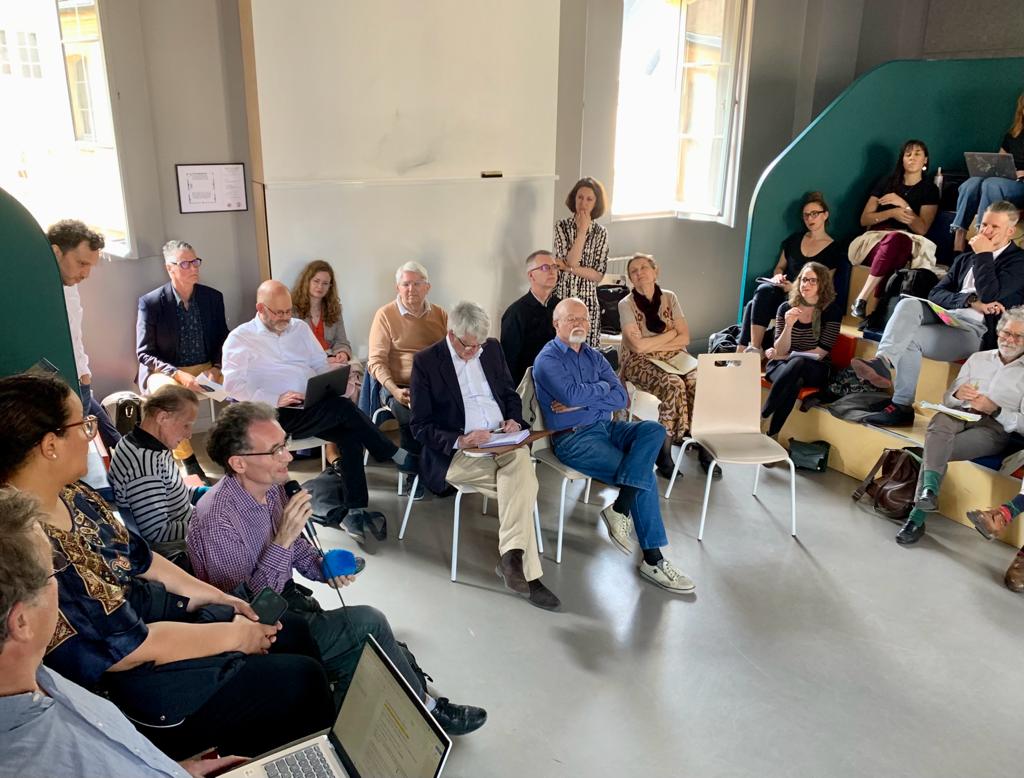
Working group launch event in Paris, May 2023, attended by some 40 members of the French and Francophone nonviolence community. Listen to the Force de la non-violence podcast episode chronicling the event (in French).

Olga Sagaidak, prominent Ukrainian culture advocate, addresses the participants of the launch event in Paris in 2023. Read her co-authored posts on Minds of the Movement about the Ukrainian art world's nonviolent engagement in the anti-occupation struggle.
Toward an international collaboration
The Institute for Peace was founded in France in 2022. Through its various working groups, IPP aims to explore and better understand peace in its many expressions and dimensions. Its work, comprising research and research-action, is cross-disciplinary and increasingly international, bringing together researchers and political and movement actors. Its mission and activities are thus complementary to ICNC's in many ways.
In May 2023, the "Civil resistance, nonviolence and the culture of peace" working group was officially launched at a seminar at the Catholic Institute of Paris, co-sponsored by ICNC. The event attracted the participation of some 40 academics, activists and civil society actors based in France (a small number from abroad by videoconference). A dozen speakers from France, Germany, Ukraine, the United States, Algeria and Djibouti addressed topics ranging from “French academia's silence on nonviolence: why?” and “Algeria's nonviolent struggle for justice for victims of violent extremism”, to “synergies and challenges at the intersection between civil resistance and peace-building” and “perspectives on and from Ukraine”.
The format was unprecedented for France, as a kind of “cross-pollination” of the French nonviolence community with academics and practitioners from around the world on such wide-ranging themes. Participants expressed a strong interest in giving greater visibility to the study of civil resistance specifically in French universities, as well as the need to establish closer links on the subject between academia and actors in the field.
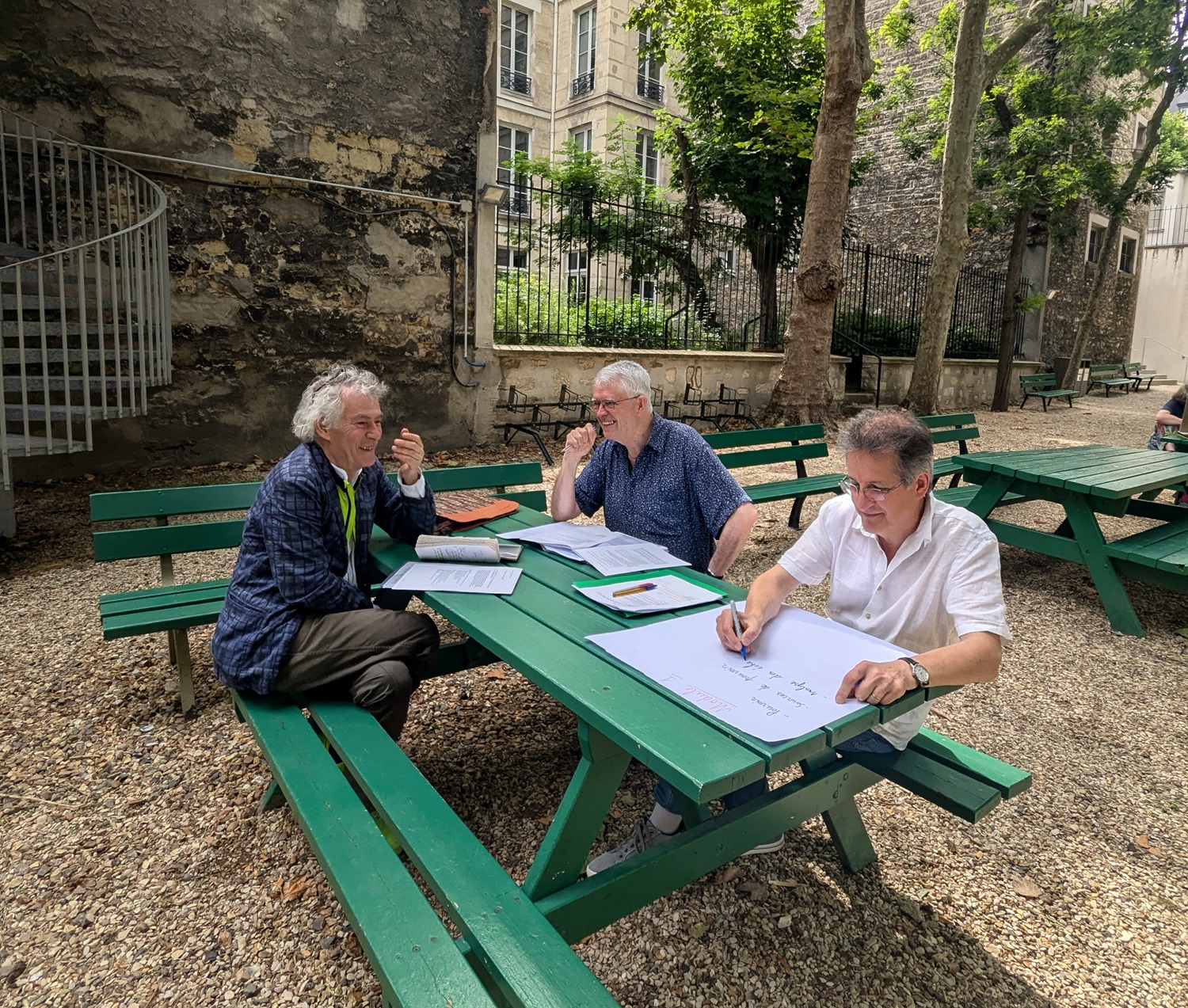
The group organized a working seminar in Paris in June 2024, attended by three ICNC staff and advisors, Ivan Marovic, Amber French and Cathy Smith (not pictured here).
A major educational project in progress
With this in mind, this year the group is developing an ICNC-IPP online course on civil resistance in French, aimed at understanding the phenomenon of people power from a social science and also peace studies perspective. The course is being built through an iterative process which began in January 2024, in consultation with a wide range of academic actors and activists based in the French-speaking world. The French language is a bridge between several regions of the world, which means that the course will above all be an opportunity for network-building and peer learning.
Although the course focuses on civil resistance, it is also nourished by French nonviolence thought and the culture of peace, not forgetting the gender prism.
A 100% original, French-language, localized online course, developed in the framework of an international partnership, corresponds to the objectives of our working group which we outlined at the beginning of this post. The uniqueness of the course project lies in its ambition to be heterogeneous on several axes:
- In terms of participant profile: activists and trainers from nonviolent movements, academics, journalists and members of civil society in France and the French-speaking world, to cross-fertilize and enrich exchanges, instead of isolating each community of practice and reflection.
- In geographical terms: the French language unites France and several countries in Africa, the Caribbean and well beyond. It's an opportunity for participants to learn from others outside their own communities and countries.
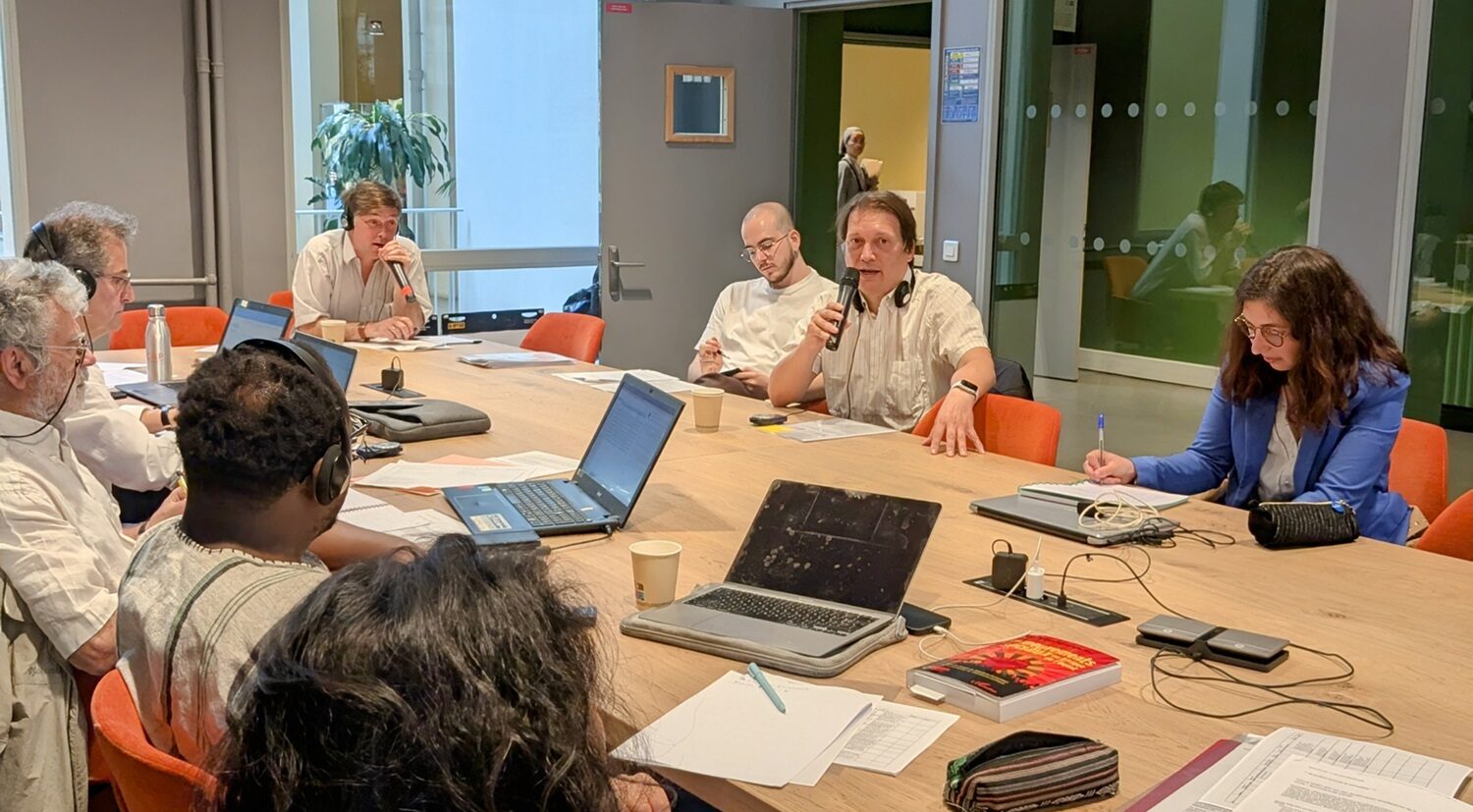
ICNC's Executive Director, Ivan Marovic addresses group members at a working seminar at the Catholic Institute of Paris, June 2024.
Activist-led applied research
We aim to produce a course that meets the specific needs of our target participants. To do this, we needed new quantitative and qualitative data that could only be achieved through activist-led applied research.
To this end, we conducted a series of 10 consultations with some 30 international stakeholders between January and June 2024. We mobilized a core team of 13 activists and organizers to co-lead the consultations. In parallel, we also conducted a survey of 164 respondents in 14 French-speaking countries; a mapping of resources on civil resistance in French; and a mapping of educational or activist support initiatives that are currently available in French. The diverse stakeholders have been participating directly in the development of the survey, the mappings and/or the course outlines.
This activist-led consultation process has multiple advantages: creating a buzz, obtaining target participant buy-in, enabling localized curriculum development based on real needs, promoting pre-existing work in curriculum and not reinventing the wheel...
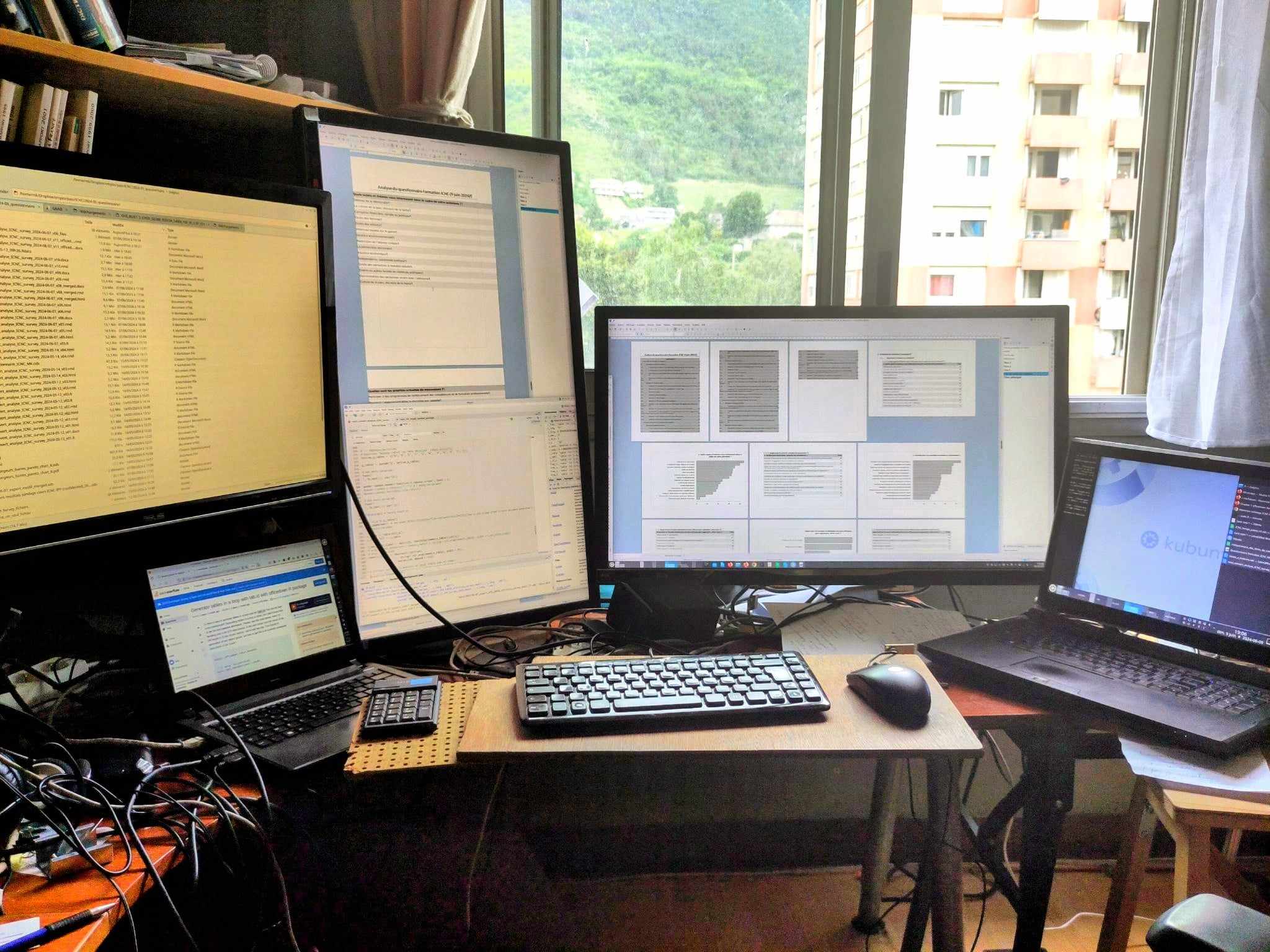
Working group member Mayeul Kauffmann, president of the Institut de recherche sur la résolution non-violente des conflits, analyzes the results of the Francophone activist survey. A narrative of the survey results will be published in English in fall 2024.
An unprecedented survey
Between April and June 2024, some 280 individuals mainly based in Africa and the Caribbean were contacted to respond to our survey, of which 164 responded. The goal of the survey—digital, in keeping with the online format of the forthcoming course—was to better understand the target participants of the course: their situation, their topics of interest, the types of content they prefer, their priorities in terms of activism and their learning needs. To find respondents, we mobilized 13 French-speaking movement trainers in our activist networks (primarily Amber's ICNC networks). These dispatchers distributed the survey to members of their respective communities of activists and engaged citizens. This sample is not representative and is only intended to allow for informed decision-making on the course project.
The 164 respondents are approximately 61% men and 39% women; two-thirds are between the ages of 20 and 40. All respondents speak French since the questionnaire was in this language. However, the latter also spoke about 20 languages such as Swahili, Creole, Malagasy, Arabic, etc. We can therefore hope that with a course in French we can reach a potentially much broader cultural-linguistic zone than originally aimed for.
Democracy defense, human rights and the culture of peace were the biggest priority themes for our respondents. The greatest needs within their respective movements were to train activists and strengthen their knowledge/skills, to exchange with like-minded movements in other countries, and to master nonviolent discipline for its strategic benefits.

Amber French and Ivan Marovic (ICNC) with other working group members in Paris, June 2024.
Next steps
Activist participation in this applied research phase as well as in course design was entirely relevant in terms of the individual interest it was able to generate and the concrete data that were obtained. However, several African trainers urged us to go beyond developing an online course, putting forward two ideas:
- Supporting small group training initiatives to deliver the course material face-to-face, and
- Producing a printed version of the course.
According to the trainers, these initiatives would increase participation (e.g. women, rural areas, conflict zones, linguistic minorities), ensure a group dynamic, optimize M&E and provide an alternative for those weary of digital security risks.
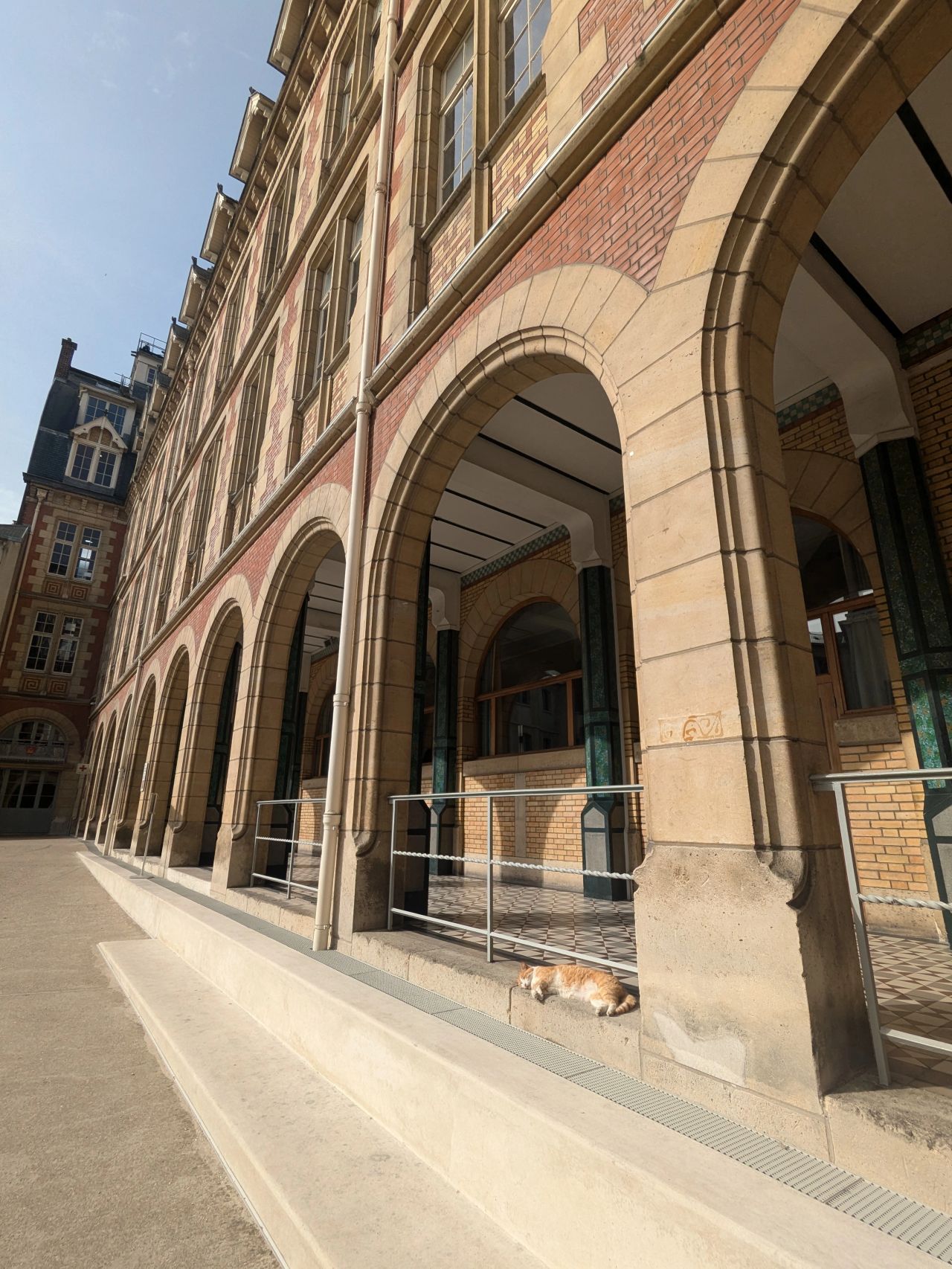
Ulysse, the Catholic Institute of Paris's "mascot". This cat has become somewhat of a star with its own Instagram account. He is spotted daily on campus, attending conferences and classes, and providing much-needed encouragement to students during exam period. ICNC and IPP will count on his support to advance nonviolence and civil resistance education in France😻.
The course will be free and will require the submission of a simple motivation letter. It will be divided into two parts: an initiation course and a more advanced course. The initiation course will be launched in early 2025, followed by the advanced course in summer 2025. For more information, contact: nonviolence@institutpourlapaix.org.
A modified version of this article will be published in French in the French periodical Alternatives non-violentes no. 213, due out in December 2024.

Amber French
Amber French is Senior Editorial Advisor at ICNC, Managing Editor of the Minds of the Movement blog (est. June 2017) and Project Co-Lead of REACT (Research-in-Action) focusing on the power of activist writing. Currently based in Paris, France, she continues to develop thought leadership on civil resistance in French.
Read More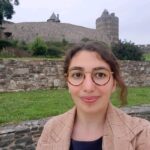
Capucine Quévillon
Capucine Quévillon is a Masters student in contemporary history at the University of Caen, France. As part of her internship at the Institute for Peace, where she is a research assistant, she is working on peace education in secondary schools.
Read More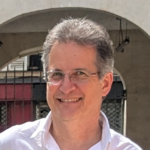
Alain Refalo
Alain Refalo is a school teacher in Haute-Garonne (France). A thought leader in the French nonviolence community, Alain is director of publication for the quarterly magazine Alternatives non-violentes (2006-2013) and helped found the Centre de ressources sur la non-violence de Midi-Pyrénées. He is the author of numerous publications on nonviolence in French.
Read More